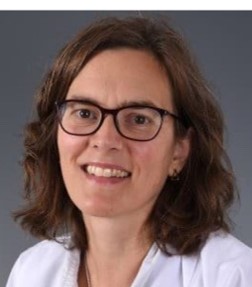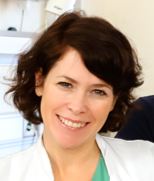Neonatal Cranial Ultrasound courses by the EuroBrainUS Group
Providing science-based, high-standard education on neonatal cranial ultrasound

The EuroBrainUS Group is a group of European neonatologists with a special interest in neonatal cranial ultrasound (CUS) and neonatal neurology. It is nested within the Brain, Development & Imaging section of the European Society for Paediatric Research (ESPR).
The EuroBrainUS Group organises basic neonatal CUS courses as well as a high-standard, expert level neonatal CUS course in order to reach the highest possible level of expertise in brain ultrasound across neonatal intensive care units.
Formal ultrasound teaching by and for neonatologists, as well as setting standards and formulating guidelines, is an imperative in a context where neonatologists are widely using bedside CUS as the first-line imaging technique to study the neonatal brain.

-
About the basic neonatal cranial ultrasound (CUS) course
The aim of the basic EuroBrainUS neonatal CUS course is to convey basic knowledge on cranial ultrasound in the preterm and term neonate. The course will introduce you to the ultrasound and doppler ultrasound technique, present the standard views that should be obtained, and teach you how to optimise your scanning settings to obtain the best possible images.
Course lectures will cover important disease entities in the neonatal period, such as: intraventricular haemorrhage and haemorrhagic infarction, white matter injury, birth asphyxia, and posterior fossa abnormalities.
Target groups:The course is targeted towards neonatal unit staff who want to learn the essential skills to perform bedside neonatal cerebral ultrasound scanning, incl. pediatricians, neonatologists, radiologists and other specialists, as well as trainees.
Learning objectives:- To gain basic knowledge on cranial ultrasound in the preterm and term neonate.
- To get familiar with the ultrasound and doppler ultrasound techniques.
- To be able to acquire the standard views, as well as optimise scanning settings to obtain good quality images.
-
To recognise the most important disease entities in the neonatal period which can be seen on brain ultrasound, such as: intraventricular haemorrhage and haemorrhagic infarction, white matter injury, birth asphyxia, and posterior fossa abnormalities.
Teaching methods:The course will be conducted through lectures by the EuroBrainUS faculty covering the most important aspects of neonatal brain ultrasound. In addition to the lectures, there will be interactive clinical case discussions and a quiz to allow discussion of a broad spectrum of abnormalities that can be visualised with current state-of-the-art ultrasound systems.Feedback from previous course participants:
-
About the advanced neonatal cranial ultrasound (CUS) course
The advanced EurUS.brain neonatal CUS course is a high-standard, expert level course with thorough interactive bedside teaching sessions in order to reach the highest possible level of expertise in neonatal brain ultrasound.
These bedside workshops are combined with lecture-based sessions by both teachers and students, including case-based discussions, reviews of clinical topics, presentation of research projects and results, and showcasing of novel and future ultrasound-related technologies.
Target groups:The course is targeted towards neonatal unit staff aiming at performing bedside neonatal cerebral ultrasound scanning at an advanced level, incl. pediatricians, neonatologists, radiologists and other specialists with a special interest in neonatal neurology and neuroimaging. It is aimed at those who are already experienced in performing bedside neonatal cranial ultrasonography and want to take their knowledge and skills to an expert level.
Learning objectives:
- To be able to recognise anatomical structures related to most common brain injuries, both in preterm and term infants.
- To detect most cerebral congenital anomalies.
- To estimate the maturation of the gyral pattern in the third trimester.
- To visualise structures in the posterior fossa via the mastoid fontanelle.
- To identify large intra-cranial veins and arteries and to know how to detect tributaries of these large vessels.
- To be equipped with the necessary skills in neonatal cerebral ultrasound to be able to cooperate in prospective studies where brain ultrasound plays an important role.
-
To be able to advance basic neonatal brain ultrasound training in the center/ country of work, and within the scope of the ESPR at large.
Teaching methods:- Pre-course tutorial produced by Paul Govaert, which is expected to be read before the course, as well as serve as post-course notes.
- Hands-on scanning sessions, where learning will be reinforced. Also, these sessions will be an opportunity for the course faculty to evaluate the student's knowledge in advanced neonatal cerebral ultrasound in order to be granted the EurUS.Brain diploma.
- Participants are encouraged to prepare a 20-minute presentation related to neonatal brain ultrasound. This can be a piece of research, a review of a related topic, or one or two interesting clinical cases, with a short time at the end for group discussion.
- Talks or lectures by the course faculty and other local colleagues with a special interest in neonatal brain ultrasound, including former students. Non-neonatal colleagues, including radiologists, ultrasound physicists and fetal medicine specialist also take part.
-
Discussion and planning on-going and future collaborations within the group, including research and educational projects.
To enable hands-on individual teaching sessions, places are limited to 5 participants per course. -
Upcoming courses
Basic Course (online) on June 6th 2026
09:00-09:10 Call open, welcome: Jeroen Dudink and Ana Alarcon
Modul 1
Moderators: Monica Fumagalli and Isabel Benavente
09:10-09:30 Cranial ultrasound, technique and timing – Jeroen Dudink
09:30-09:40 Discussion
09:40-10:00 Doppler ultrasound, technique and clinical aspects – Simone Schwarz
10:00-10:10 Discussion
10:10-10:30 Intraventricular haemorrhage and complications - Mayka Bravo
10:30-10:40 Discussion[10.40-11:00 Coffee/tea break]
Modul 2Moderators: Mayka Bravo and Simone Schwarz
11:00-11:20 White matter injury - Nuria Carreras
11:20-11:30 Discussion
11:30-11:50 Acquired neonatal posterior fossa lesions – Tobias Muehlbacher
11:50-12:00 Discussion
12:00-12:20 The term baby with perinatal asphyxia – Isabel Benavente
12:20-12:30 Discussion[12:30- 13:00 Lunch break]
Modul 3Moderator: Tobias Muehlbacher13:00-14:00 Interactive case discussion - Thais Agut, Monica Fumagalli and Ana Alarcon
14:00-14:15 Closing remarks and goodbye - Jeroen Dudink and Ana Alarcon>>To register for the Basic Neonatal CUS Course on 31 June 2026, please click here.
Advanced Course (in person): TBA
-
Meet the EuroBrainUS Group
 Thais AgutNeonatologist, PhD, MDHospital Sant Joan de DéuInst. de Recerca Sant Joan de DéuUniversitat de BarcelonaBarcelona, Spain
Thais AgutNeonatologist, PhD, MDHospital Sant Joan de DéuInst. de Recerca Sant Joan de DéuUniversitat de BarcelonaBarcelona, Spain Ana Alarcon AllenNeonatologist, Ass. Professor, MDHospital Sant Joan de DéuInst. de Recerca Sant Joan de DéuUniversitat de BarcelonaBarcelona, Spain
Ana Alarcon AllenNeonatologist, Ass. Professor, MDHospital Sant Joan de DéuInst. de Recerca Sant Joan de DéuUniversitat de BarcelonaBarcelona, Spain Roberta ArenaNeonatologist, MDSan Giovanni CalibitaFatebenefratelli Isola TiberinaRome, Italy
Roberta ArenaNeonatologist, MDSan Giovanni CalibitaFatebenefratelli Isola TiberinaRome, Italy Juan ArnaezNeonatologist, PhD, MDHospital Universitario of BurgosBurgos, Spain
Juan ArnaezNeonatologist, PhD, MDHospital Universitario of BurgosBurgos, Spain Marco BartocciNeonatologist, PhD, MDKraolinska University HospitalStockholm, Sweden
Marco BartocciNeonatologist, PhD, MDKraolinska University HospitalStockholm, Sweden Isabel Benavente-FernándezNeonatologist, PhD, MDUniversity of CádizHospital Uni. Puerta del MarCadiz, Spain
Isabel Benavente-FernándezNeonatologist, PhD, MDUniversity of CádizHospital Uni. Puerta del MarCadiz, Spain Mayka BravoNeonatologist, PhD MDLa Paz University HospitalMadrid, Spain
Mayka BravoNeonatologist, PhD MDLa Paz University HospitalMadrid, Spain Fernando CabañasNeonatologist, PhD, MDDirector of Neo. & Paed. unitsUniversity Hospital QuirónMadrid, Spain
Fernando CabañasNeonatologist, PhD, MDDirector of Neo. & Paed. unitsUniversity Hospital QuirónMadrid, Spain Nuria CarrerasNeonatologist, MDHospital Sant Joan de DéuInst. de Recerca Sant Joan de DéuUniversitat de BarcelonaBarcelona, Spain
Nuria CarrerasNeonatologist, MDHospital Sant Joan de DéuInst. de Recerca Sant Joan de DéuUniversitat de BarcelonaBarcelona, Spain Olivier ClarisNeonatologist, ProfessorHopital Femme Mère Enfants
Olivier ClarisNeonatologist, ProfessorHopital Femme Mère Enfants
University Hospital of Lyon
Claude Bernard University
France Jeroen DudinkNeonatologist, PhD, MDWilhelmina Children's HospitalUniversity Medical Centre UtrechtUtrecht, The Netherlands
Jeroen DudinkNeonatologist, PhD, MDWilhelmina Children's HospitalUniversity Medical Centre UtrechtUtrecht, The Netherlands Monica FumagalliNeonatologist, Ass. ProfessorOspedale MaggioreUniversity of MilanMilan, Italy
Monica FumagalliNeonatologist, Ass. ProfessorOspedale MaggioreUniversity of MilanMilan, Italy Paul GovaertNeonatologist, Brain Ultras. SpecialistZNA Middelheim Antwerp Neo. Unit, GZA Antwerp Neonatal UnitUZ Brussel Neonatal UnitBelgium
Paul GovaertNeonatologist, Brain Ultras. SpecialistZNA Middelheim Antwerp Neo. Unit, GZA Antwerp Neonatal UnitUZ Brussel Neonatal UnitBelgium Sandra HorschNeonatologist, PhD, MDHelios Klinikum Berlin BuchBerlin, Germany
Sandra HorschNeonatologist, PhD, MDHelios Klinikum Berlin BuchBerlin, Germany Simón Lubián LópezNeonatologist, PhD, MDHospital Puerta Del Mar, INiBICA
Simón Lubián LópezNeonatologist, PhD, MDHospital Puerta Del Mar, INiBICA
Cádiz, Spain Alessandro ParodiNeonatologist, PhD, MDIRCCS Istituto Giannina GasliniGenoa, Italy
Alessandro ParodiNeonatologist, PhD, MDIRCCS Istituto Giannina GasliniGenoa, Italy Adelina PellicerNeonatologist, Professor, MDChair of Dept. of NeonatologyLa Paz University HospitalMadrid, Spain
Adelina PellicerNeonatologist, Professor, MDChair of Dept. of NeonatologyLa Paz University HospitalMadrid, Spain Luca RamenghiNeonatologist, Professor, MDHead of Dept. of NeonatologyIRCCS Istituto Giannina GasliniGenoa, Italy
Luca RamenghiNeonatologist, Professor, MDHead of Dept. of NeonatologyIRCCS Istituto Giannina GasliniGenoa, Italy Sylke SteggerdaNeonatologist, PhD, MDLeiden University Medical CentreLeiden, The Netherlands
Sylke SteggerdaNeonatologist, PhD, MDLeiden University Medical CentreLeiden, The Netherlands Eva ValverdeNeonatologist, PhD, MDLa Paz University HospitalMadrid, Spain
Eva ValverdeNeonatologist, PhD, MDLa Paz University HospitalMadrid, Spain
Tobias Mühlbacher
Neonatologist, MD
University Hospital Zurich
Zurich, Switzerland
Simone Schwarz
Neonatologist, MD
University Hospital Essen
Essen, Germany Maria Luisa Tataranno
Maria Luisa Tataranno
Neonatologist, MD
Department of Neonatology, Wilhelmina Children Hospital, University Medical Center UtrechtThe Netherlands -
List of publications
Here is a list of publications in Pediatric Research by the EuroBrainUS Group:
- Cranial ultrasound by neonatologists
(To view the paper, click here)
- State-of-the-art neonatal cerebral ultrasound: technique and reporting
(To view the paper, click here)
- Cranial ultrasound findings in preterm germinal matrix haemorrhage, sequelae and outcome
(To view the paper, click here)
- Ultrasound of acquired posterior fossa abnormalities in the newborn
(To view the paper, click here)
- Preterm white matter injury: ultrasound diagnosis and classification
(To view the paper, click here)
- Diagnostic and predictive value of Doppler ultrasound for evaluation of the brain circulation in preterm infants: a systematic review
(To view the paper, click here)
- The development and validation of a cerebral ultrasound scoring system for infants with hypoxic-ischaemic encephalopathy
(To view the paper, click here)
-
History of the EuroBrainUS group
The idea to initiate European CUS training courses at an expert level was born in 2015 during a meeting in Rome by Paul Govaert, Adelina Pellicer, Fernando Cabañas and Luca Ramenghi, the founders of the EuroBrainUS group.
The aim was to organise a high standard, expert level CUS course with thorough interactive bedside teaching sessions in order to reach the highest possible level of expertise in brain ultrasound across neonatal intensive care units.
After a few constitutional meetings, the first course was held in Madrid in February 2016. During this meeting Sandra Horsch, Ana Alarcon, Sylke Steggerda, Jeroen Dudink and Eva Valverde joined the board of the EuroBrainUS Group. Since then, nine more courses have been successfully organised in six European countries, more than forty students have successfully completed the course, some of whom have been invited to join the group and are now members of the EuroBrainUS board.
In 2020 the group produced an educational monograph on neonatal brain ultrasound, which was published in Pediatric Research as a state-of-the-art description of CUS by neonatologists (please see 'list of publications' above). A number of research collaborations are underway within the group.
Since 2020 the EuroBrainUS Group is part of the Brain, Development & Imaging Section of the ESPR.
In addition to the high standard, expert level CUS courses, in 2022 the EuroBrainUS Group will offer basic CUS training courses for residents, trainees and neonatologist starting to use CUS in term and preterm neonates.
